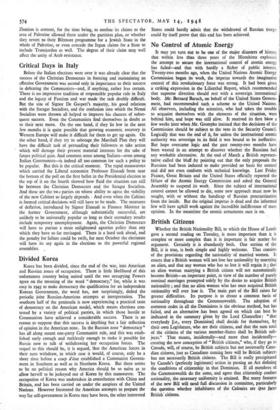Critical Days in Italy
Before the Italian elections were over it was already clear that the success of the Christian Democrats in forming and maintaining an effective Government was second only in importance to their success in defeating the Communists—and, if anything, rather less certain. There is no impressive tradition of responsible popular rule in Italy and the legacy of Fascism and war made the task doubly difficult. But the size of Signor De Gasperi's majority, his good relations with the Saragat Socialists, and the confusion into which the Nenni Socialists were thrown all helped to improve his chances of subse- quent success. Even the Communists find themselves in doubt as to their next move. On the one hand, if they lie low in the next few months it is quite possible that growing economic recovery in Western Europe will make it difficult for them to get up again. On the other hand, if they try to sabotage _the Marshall Plan they will have the difficult task of persuading their followers to take action which will damage their present material interests for the sake of future political gain. And common sense among Italians—even among Italian Communists—is indeed all too common for such a policy to be popular. But this is the critical moment. The rapid manoeuvres which carried the Liberal economist Professor Einaudi from near the bottom of the poll on the first ballot in the Presidential election to the top of it on the fourth showed how fluid the situation can still be between the Christian Democrats and the Saragat Socialists. And these are the two parties on whose ability to agree the stability of the new Cabinet so largely depends. And even when the Cabinet is formed critical decisions will still have to be made. The measures of deflation, introduced by Signor Einaudi as Finance Minister in the former Government, although substantially successful, are unlikely to be universally popular so long as their secondary results include temporary unemployment. Again, the Christian Democrats will have to pursue a more enlightened agrarian policy than any which they have so far envisaged. There is a hard task ahead, and the penalty for failure could be swift, for next October the electorate will have its say again in the elections to the powerful regional assemblies.






























 Previous page
Previous page